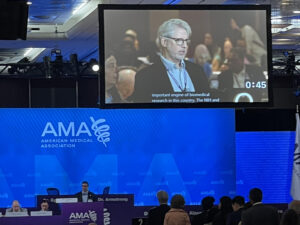NIH Grant Funding for Medical Research
The ACR spearheaded Resolution 502, which called for the protection of biomedical researchers’ ability to negotiate indirect costs for NIH grants. It attracted many cosponsors and significant vocal support at the meeting from like-minded societies and was adopted by the HOD. The resolution’s adoption ensures that the largest physician advocacy organization in the U.S. will join the ACR in leading the opposition against caps on indirect costs for NIH grants.

Gary Bryant, MD, chair of the ACR’s delegation, addresses the HOD on the importance of supporting biomedical research and public health infrastructure.
Earlier this year, the NIH implemented a policy to cap indirect costs for research grants at 15%. This policy change, announced in February, applies to both current and future NIH grants. The policy has faced legal challenges, with a court temporarily blocking its implementation in some cases.
The cap on indirect costs is one part of a bigger Trump administration push to reduce federal funding for healthcare research. For example, as part of the administration’s strategy to restructure the Department of Health & Human Services (HHS), research programs dedicated specifically to rheumatic diseases—such as the Lupus Program at the Centers for Disease Control & Prevention (CDC Lupus Program) and the National Lupus Outreach & Clinical Trial Education Program at the HHS Office of Minority Health (OMH Lupus Program)—have been consolidated or cut. The ACR is working with partners, including the Lupus Foundation of America and Arthritis Foundation, to oppose cuts and communicate the value of federal funding for rheumatic disease research by engaging in a comprehensive letter-writing campaign to HHS.
The ACR’s HOD resolution continues this charge. Though it is specific to the 15% cap on indirect costs for NIH grants, the resolution is an extension of the ACR’s overall work to protect public health infrastructure and research. The ACR will continue its drive to develop these policies and others based on the priorities of rheumatologists and coalesce around the support of other concerned stakeholder specialty societies.
This advocacy and coalition-building is made possible because ACR members join and maintain memberships in the AMA, allowing the delegation representation at the meeting. Join now to not only access AMA member benefits for yourself, but also to support this work to elevate rheumatology issues at the national level.
Inadequate Reimbursement for Biosimilars
Resolution 103, submitted by the American Society of Gastrointestinal Endoscopy (ASGE) and cosponsored by the ACR, called for the AMA to work with stakeholders to advocate for legislation that will amend Section 1847A(c)(3) of the Social Security Act to permanently remove manufacturer rebates from the average sales price (ASP) methodology for biologics.

